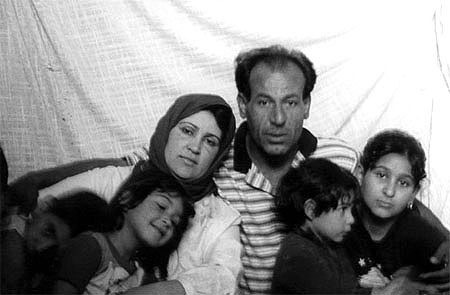
Umm Islam with husband and children, 'Summood Camp', Jerusalem, June 1998
|
 Umm Islam with husband and children, 'Summood Camp', Jerusalem, June 1998 |
Umm Islam, 'Sumood camp', East Jerusalem, June 23:
|
|
It's the friends in BADIL, a Bethlehem-based NGO devoted to legal work, who tell me about 'Sumood camp'. The people here are Palestinian Jerusalemites who, in August 1997, set up a tented camp on waqf land near Ras al-Amud in protest against rising rents and threats of confiscation of their Jerusalem ID cards. Their protest attracted considerable media attention. Soon after the protest began, a permit to build on the land that had been denied before was granted by the Municipality... Of the original 75 families of 'Sumood camp', 22 refused to give up their living demonstration since they couldn't afford Jerusalem rents, and would lose their ID cards if they left the city area. They decided to stay together, and moved into an unfinished Islamic waqf building on Salahadin street, close to the American Colony.
Mahfooz Abu Turk, a news photographer, is the chairman of the committee that runs 'Sumood camp', and has been appointed by Orient House to negotiate on its behalf with the waqf. He has tent space in the camp but it's more symbolic than real. He turns up to brief me, show me round and introduce me to possible speakers. Inside the waqf building tents have been strung up on wooden struts over untiled concrete floors. It's strange to see tents in such a setting; they cover the ground floor. The waqf administration are saying now that they have found the funds needed to finish the building, and the demonstrators must move out. 'Sumood camp' people are insisting on being moved to homes whose rents they can afford. Negotiations were still going on at the time of my visit. Mahfooz says that as a result of their campaign, the confiscation of certain categories of Jerusalem ID cards has stopped. Mahfouz's neighbours are Abu and Umm Islam. He knocks on their partition, and I |
enter the tent they occupy with their five children. There are areas partitioned off for kitchen and sleeping - probably the parents sleep there, the children in the reception area, furnished with floor mats, cushions and a low settee. Umm Islam agrees to record, and I photo her with her oldest child, a daughter of 12 years Umm Islam is a Jerusalemite, her husband is from the West Bank, a low-paid construction worker caught in the rent squeeze that forms one 'arm' through which Israel aims to empty the city of Palestinians.
Umm Islam speaks: |
[Hajji Rafiqa Sleimi] ['Odette'] Copyright©2005 |
|